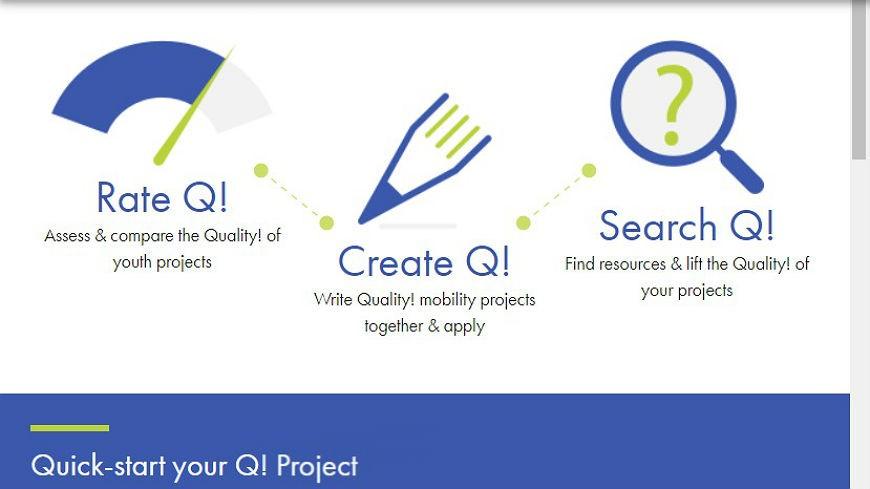New Quality Tools for Learning Mobility
In Spring 2019, the European Platform on Learning Mobility (EPLM) launched two new tools to support quality in learning mobility projects in the youth field: the www.QualityMobility.app and the Handbook on Quality in Learning Mobility.
What do we mean with ‘Learning Mobility in the Youth Field’?
The term 'Learning mobility in the field of youth' refers to the mobility of young people across countries, inside and outside Europe, in formal and non-formal learning settings. Learning mobility takes place in the frame of exchange programmes with the aim of promoting and developing personal and professional competences, communication, interpersonal and intercultural skills, and active citizenship among others. The competences developed by young people taking part in mobility experiences contribute also to the recognition of youth work and non-formal learning, and to the increase of employment opportunities
Learning mobility in the youth field – defined as stays abroad undertaken for a period of time and with a clear pedagogical purpose – has been at the core and an integral feature of European youth policies and practices for a very long time. It is an extremely multifaceted phenomenon which covers many forms of activities and involves many types of actors and stakeholders. In the youth field we are generally speaking of non-formal learning, that is planned and organised learning taking place outside of formal education systems and curricula, but the boundaries of learning mobility are fluid, and activities may include such diverse activities as, e.g.
- Short-term encounters between youth groups;
- Long-term school-stays in upper secondary general education;
- International meeting of young people or youth leaders;
- Study sessions, training courses and training of trainers;
- European Solidarity Corps and other types of national and international mobility of volunteers;
- Mobility of youth workers;
- So-called “work-camps” (multilateral encounters around a common project);
- Placements in enterprises.
The background of the new Quality Tools for learning mobility in the field of youth
To support quality in projects of learning mobility in the youth field, during spring 2019 two tools were launched in the framework of the European Platform on Learning Mobility (EPLM): the www.QualityMobility.app and the Handbook on Quality in Learning Mobility.
In 2015, the team of the EU-CoE Youth Partnership launched the work on developing a Quality Framework for Learning Mobility in the Field of Youth within the context of the EPLM, which the EU-CoE coordinates since 2014. The aim of this endeavour was to reach a clear and shared understanding of what this elusive concept of “quality in mobility” actually is and to develop concrete guidelines and definitions that can help practitioners across Europe to achieve even higher quality in the projects they are undertaking.
The work was carried out in three phases, each of which ended with a concrete deliverable:
- A set of 22 quality principles for mobility, which constitutes a tool for reflection to frame the overall discussion of quality in mobility;
- A set of detailed 119 quality indicators that function as a targeted check-list for practitioners to ensure that learning outcomes of the project, as well as issues linked to inclusion, health and safety for participants, their active participation in the process etc. are safeguarded;
- A quality handbook that underpins the principles and the indicators with more extensive explanations and references to relevant resources that provide further information, relevant tools, or examples of implementation in practice.
Working groups consisting of researchers and experts were set up to elaborate draft versions of the deliverables of this undertaking, then open for comments among the public through an online consultation, and their outputs were subsequently validated by the Steering Group of the EPLM and at European expert seminars.
Furthermore, the www.QualityMobility.app, ‘Q! App’ in short, was developed in the framework of the EPLM in line with the Principles for Quality in Learning Mobility. The Q! App allows project organisers to assess any mobility project according to the quality principles and compare it with assessments of their colleague organisers. The Q! App also guides project organisers to a quality mobility project using the quality indicators and many youth work resources. Project partners can collaboratively develop their project in the app and download it for use in a funding application.
To increase the knowledge and use of these two brand new tools across Europe, the team of the Partnership between the European Commission and the Council of Europe in the field of youth (coordinating EPLM), in cooperation with the SALTO Inclusion and Diversity Resource Centre organised a meeting in July to create a network of Quality Ambassadors (multipliers). A group of 60 new multipliers from different parts of Europe got to know more about these new tools and formed a network on learning mobility experts.
For more information please contact Tiina Hokkanen, email tiina.hokkanen(at)alli.fi.
